九年级Unit3SectionB
+Unit+3+Section+B+单词、短语、知识点默写及短文填空 人教版九年级英语全册+

人教版九年级全一册Unit 3 Section B 单词、短语、知识点默写及短文填空一、单词1.迷人的;极有吸引力的2.不昂贵的3.不拥挤的;人少的拥挤的n.人群v.挤满4.便利的;方便的5.商场;购物中心6.职员7.拐角;角落8.礼貌地;客气地9.要求;请求10.方向;方位11.正确的;恰当的12.有礼貌的;客气的13.直接的;直率的14.讲某种语言的;发言者15.谁;什么人16.不礼貌的;粗鲁的17.住址;地址;通讯处18.地下的;地铁19.停车场;停车区20.课程;学科21.意大利的;意大利人的;意大利人;意大利语意大利二、短语1.礼貌地寻求帮助2.听起来没那么有礼貌3.在不同的情况下4.依靠;信赖;取决于5.花费时间/金钱做某事6.引入;导入7.与某人交流8.去...的路9.介绍你自己10.因(做)某事感谢某人三、短文填空Could you please ...?When you visit a foreign country, it is important to know how to ask for help (polite). For example, “Where are the restrooms?” or “Could you please (tell) me where the restrooms are?” are similar(request) for directions to a place. Both (be) correct English, but the first one sounds less (polite). That is because it is a very direct question. It is not enough to just ask a question (correct). We also need to learn how to be polite by (be) less direct — or more (direct) — when we ask for help.(ask)for information or help is a very common and necessary activity, (especial) when we visit a foreign country. So (know) how to ask for information politely is important. In English, “Where are the restrooms?” and “Could you please tell me where the restrooms are” are similar requests both are correct English, but the (one) could sound rude. It’s important to use correct language, but sometimes this alone is not enough we need to learn how to be (polite) when we make requests.In English, as in Chinese, we change the way we speak when we talk with (difference) people. The (expression) you use might depend on whom you are (speak)to or how well you know them. If you (say) to your teacher, “When is the school trip?”, this might sound (polite). But if you say, “Excuse me, Mr. West. Do you know when the school trip is?”, this will sound much more polite. However, it is all right to ask direct questions in some (situation), like with your classmates.Usually polite questions (be) longer and include more language such as “Could you please ...?” or “Can I ask ...?” It sounds more polite to say, “Peter, could you please tell me your e-mail address?” than “Peter, tell me your e-mail address.” Sometimes we even need to spend time (lead) in to a request. For example, with a (strange) on the street, we might first say, “Excuse me, I wonder if you can help me” or “I’m sorry to trouble you, but ...” before (ask)for help.It might seem more difficult to speak politely than be direct. However, it is important (learn) how to use proper language. This will also help you (become) better at English, or any other language you wish to speak.。
人教版英语九年级unit3 SectionB知识点讲解
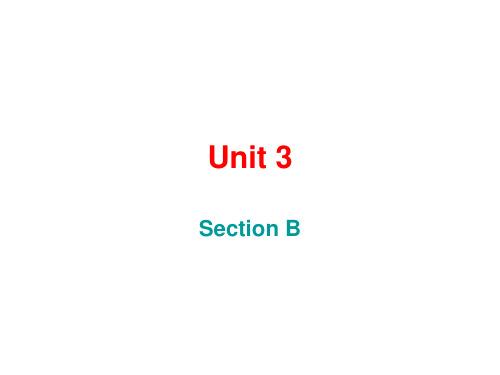
eg:He requested some hot water from me.
b.request sb. to do sth.要求/请求某人做某事
eg:I request her to go alone.
c.request+that从句(用虚拟语气,(should)+do)
eg:I request that she (should) go alone.
价格的高低用high/low.
eg:The price of the car is high.
英语中常见的否定前缀有: 1)dis-"不;非"
like→dislike agree→disagree 2)in-(im-,ir-)" 不;非”
expensive→inexpensive polite→impolite possible→impossible 3)un-"不;非" crowded→uncrowded happy→unhappy healthy→unhealthy
everyone__p_o_li_te_ly___.
• request n.&v.要求;请求
1) n.[C] the request for.... ......的要求/请求
eg:We must make a request for help.
2) v.
(提出请求)
a.request sth (from sb.) (向某人)要求某物
(在建筑物内部)
eg:I found a boy crying in the corner of the room.
2)at/on the corner of... 在......拐角处 (在建筑物外部)
人教版英语九年级全册Unit3sectionB说课稿

二、学情分析导
(一)学生特点
本节课面向的是九年级学生,这个年龄段的学生具有以下特点:好奇心强,对新鲜事物有较高的兴趣;思维活跃,具有一定的批判性和创造性;认知水平逐渐从具体运算向形式运算转变,能够进行抽象逻辑思维;学习兴趣方面,他们更倾向于参与有趣、互动性强的学习活动;在学习习惯上,部分学生已经形成了良好的学习习惯,如预习、复习等,但也有部分学生缺乏自律,需要教师引导和监督。
为了激发学生的学习兴趣和动机,我将采取以下策略或活动:
1.创设真实情境:通过设置真实的问路和指路场景,让学生在实际语境中感受英语的实用性,提高他们的学习兴趣。
2.互动式教学:采用小组讨论、角色扮演等形式,增加课堂互动,让学生在轻松愉快的氛围中学习。
3.激励性评价:针对学生的每一次进步和表现给予积极的评价,增强他们的自信心,激发学习动力。
(三)教学重难点
根据对学生的了解和教学内容的分析,本节课的教学重点和难点如下:
1.教学重点:
-新词汇和句型的掌握,能够熟练运用问路和指路的表达方式。
-听力理解能力的提高,能够听懂并获取对话中的关键信息。
2.教学难点:
-词汇的发音和用法,尤其是表示地点和方向的词汇。
-对话中的长句和复杂句型,需要学生通过反复练习才能熟练掌握。
3.对话:通过听力练习和角色扮演,让学生在实际场景中运用所学知识进行交流。
(二)教学目标
1.知识与技能:
-掌握本节课的新词汇和句型,能够熟练运用问路和指路的表达方式。
-提高听力理解能力,能够听懂并获取对话中的关键信息。
-培养口语表达能力,能够在实际场景中运用所学知识进行有效交流。
英语人教版九年级全册Unit 3 Section B
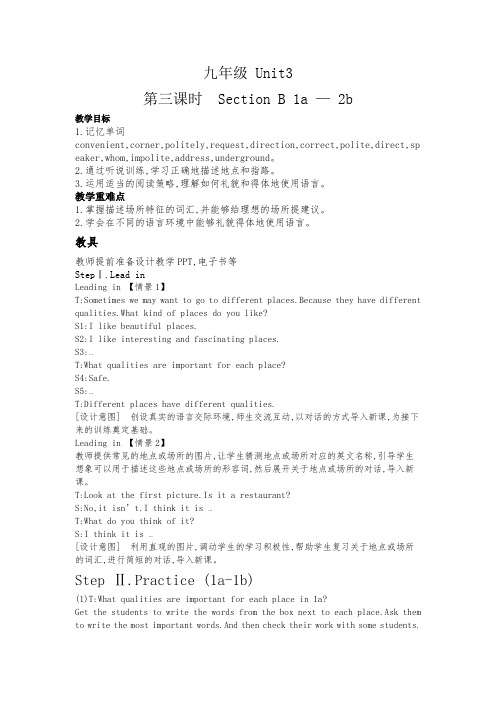
九年级 Unit3第三课时Section B 1a — 2b教学目标1.记忆单词convenient,corner,politely,request,direction,correct,polite,direct,sp eaker,whom,impolite,address,underground。
2.通过听说训练,学习正确地描述地点和指路。
3.运用适当的阅读策略,理解如何礼貌和得体地使用语言。
教学重难点1.掌握描述场所特征的词汇,并能够给理想的场所提建议。
2.学会在不同的语言环境中能够礼貌得体地使用语言。
教具教师提前准备设计教学PPT,电子书等StepⅠ.Lead inLeading in 【情景1】T:Sometimes we may want to go to different places.Because they have different qualities.What kind of places do you like?S1:I like beautiful places.S2:I like interesting and fascinating places.S3:…T:What qualities are important for each place?S4:Safe.S5:…T:Different places have different qualities.[设计意图] 创设真实的语言交际环境,师生交流互动,以对话的方式导入新课,为接下来的训练奠定基础。
Leading in 【情景2】教师提供常见的地点或场所的图片,让学生猜测地点或场所对应的英文名称,引导学生想象可以用于描述这些地点或场所的形容词,然后展开关于地点或场所的对话,导入新课。
T:Look at the first picture.Is it a restaurant?S:No,it isn’t.I think it is …T:What do you think of it?S:I think it is …[设计意图] 利用直观的图片,调动学生的学习积极性,帮助学生复习关于地点或场所的词汇,进行简短的对话,导入新课。
英语人教PEP版九年级(上册)Unit3SectionB词汇

16. underground [ˌʌndə(r)ˈɡraʊnd] adj.地下的; n.地铁 ①underground是由under(prep.在......下面)+ ground(n.地面)构成 ②可作名词,意为“地铁”,美式英语中用subway.
3. 古城堡对我有某种奇特的吸引力。
Old castles have a certain strange _f_a_s_c_i_n_a_t_io__n_ for me.
2.inexpensive [.ɪnɪk'spensɪv] adj.不昂贵的
由in-(否定前缀)+ expensive (adj.昂贵的)构成
correct [kə'rekt] adj.正确的;恰当的 polite [pə'laɪt] adj.有礼貌的;客气的 direct [daɪ'rekt] adj.直接的;直率的 speaker [ˈspiːkə(r)] n.讲(某种语言的)人;发言者 whom [huːm] pron.谁;什么人 impolite [.ɪmpə'laɪt] adj.不礼貌的;粗鲁的 address [ə'dres] n.住址;地址;通讯处 underground [ˌʌndə(r)ˈɡraʊnd] adj.地下的;n.地铁 parking lot 停车场;停车区 course [kɔː(r)s] n.课程;学科 Italian [ɪ'tæljən] adj.意大利(人)的;
Ex:你用线把风筝往正确的方向拉上去。 You helped the kite go up _in__t_h_e_r_i_g_h_t_d_i_re_c_t_io_n_ using the string.
Unit3SectionB(1a-1e)课件人教版九年级英语全册
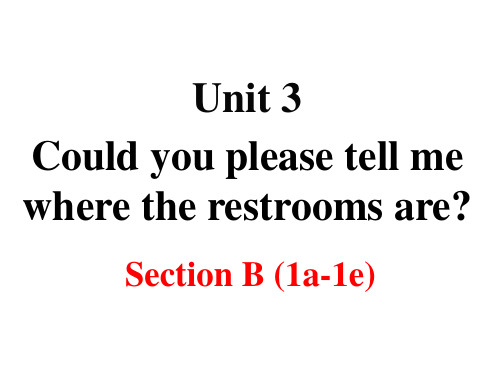
Section B (1a-1e)
Words Review
fascinating adj. 迷人的;极有吸引 力的
inexpensive adj. 不昂贵的 uncrowded adj. 不拥挤的;人少的 convenient adj. 便利的;方便的
F. uncrowded
Talk about the places in our city using the words above.
A: The Fine Arts Museum is really interesting.
B: Yes, and it’s beautiful, too.
Look at the picture and look through the conversations, then answer the questions .
e.g.Internet makes it convenient for us to get in touch with each other.
互联网使得我们相互联系便利了。
convenience是convenient的名词形式,既可作可数名词,意 为“便利的设施”,也可作不可数名词,意为“方便,便 利”。 ►The house has all the modern convenience.
Summary
What have we learnt today? Some adjectives : fascinating, inexpensive,
uncrowded, convenient … …
How to ask for information politely
英语人教PEP版九年级(上册)unit3SectionB(2024版新教材)

1b. Talk about places in your city using the words in 1a.
A:The Fine Arts Museum is really interesting. B:Yes, and it's beautiful,too.
East Lake Hubei Provincial Museum Qingchuan Pavilion
museum. Boy: Science? We always go to science museums. I want to go to a children’s
museum. They’re more fun. Girl 2: Well, I’m too old for a children’s museum. Why don’t we go to an art museum? Clerk: Why don’t you go to the computer museum? There are a lot
polite
less polite impolite
2a. Where do you need to make polite requests? Think of some possible situations. Discuss them with your partner.
Shops or new places.
help politely. (adv. 礼貌地)
Paragraph 2 Good speakers change the way they speak in different situations. …
Paragraph 3 Usually polite questions are longer.
人教版九年级英语全册优秀教学案例:Unit3SectionB

三、教学策略
(一)情景创设
1.利用多媒体展示杰出人物的事迹,如宇航员、体操运动员等,让学生感受到他们的伟大和励志。
2.创设情境,让学生模拟杰出人物的经历,如模仿宇航员的太空行走、模仿体操运动员的动作等,增强学生的参与感和体验感。
3.通过展示图片、视频等视觉资源,营造生动、直观的学习氛围,激发学生的学习兴趣和想象力。
3.教师简要介绍本节课的主题和目标,为新课的讲授做铺垫。
(二)讲授新知
1.教师引导学生学习本节课的主要词汇和短语,如“Amazing People”, "world-class", "astronaut", "gymnastics", "gold medal"等。
2.通过示例和练习,让学生掌握表示过去时间的状语从句,如"When he was young, he...", "By the time he was..., he..."等。
3.鼓励学生主动寻找答案,通过自主学习、合作讨论等方式,提高解决问题的能力。
4.教师给予及时反馈和引导,帮助学生建立正确的思维模式和价值观。
(三)小组合作
1.划分学习小组,鼓励学生互相合作、互相学习,培养团队精神和集体荣誉感。
2.设计小组讨论任务,如共同完成一篇关于杰出人物的短文、进行角色扮演等,让学生在合作中提高英语运用能力。
人教版九年级英语全册优秀教学案例本案例背景针对人教版九年级英语全册Unit 3 Section B进行设计。该章节以“Amazing People”为主题,通过讲述不同领域杰出人物的事迹,引导学生学习英语语言知识,同时激发学生对榜样人物的敬仰之情,培养他们积极进取的精神风貌。本节课主要内容涉及:1.学习描述人物的基本句型;2.掌握表示过去时间的状语从句;3.提高听力理解能力;4.培养合作、探究学习精神。
人教版九年级英语全册教学设计:Unit3SectionB

3.学生跟随教师朗读课文,注意语音语调,理解文章内容。
4.教师引导学生关注文章中关于人物描述的表达方式,总结句型和语法结构,提高学生的阅读理解能力。
(三)学生小组讨论
1.教师将学生分成小组,每组选择一个人物,讨论并记录该人物的成就、经历和特点。
1.部分学生对英语学习缺乏兴趣,课堂参与度不高,影响学习效果。
2.学生的阅读理解能力有待提高,对文章深层含义的把握和推理判断能力不足。
3.口语表达能力有限,缺乏自信,不敢在公共场合用英语表达自己的观点。
4.写作能力较弱,句子结构单一,篇章组织能力不足。
针对以上学情,本章节的教学应注重激发学生的学习兴趣,提高课堂参与度;加强阅读训练,提高学生的阅读理解能力;创设口语表达机会,培养学生的自信心;设计多样化的写作任务,提高学生的篇章组织能力。同时,关注学生的个体差异,因材施教,使每个学生都能在原有基础上得到提高。
4.针对写作能力的提高,采用以下教学策略:
a.设计不同类型的写作任务,如日记、书信、故事等,让学生在实践中提高写作能力。
b.引导学生关注篇章结构,学会使用过渡词和连接词,使文章条理清晰。
c.举办写作讲座,教授写作技巧,提学生的写作水平。
d.开展互评、小组评等活动,让学生在评价他人作品的过程中,学习借鉴优点,改进自身不足。
3.教师播放一段与本节课主题相关的短视频,激发学生的兴趣,引导学生关注本节课的核心词汇和句型。
4.通过提问方式,引导学生预测本节课的学习内容,为新课的学习做好铺垫。
(二)讲授新知
1.教师带领学生学习和复习与本节课相关的词汇和短语,如confident, perform, talented, achieve, overcome等,通过图片、实物等辅助教学,帮助学生形象记忆。
Unit3Unit3SectionB写作课课件人教版英语九年级全册

Let’s read and think.
(2017 年 浙 江 中 考 【 改 编 】 ) 假如 你 是 李 磊 , 暑 假 期 间 你 将 去 英 国 Oxford University进行短期的游学交流体验。学习之前,你要写信给负 责人,有礼貌地向她咨询有关信息。
提示:1. 介绍自己。 2. 告知对方什么时间到牛津大学。 3. 礼貌地询问你想知道的信息。 4. 感谢她的帮忙。
Other
Could you please tell me how much the courses cost?
China. 2. I’m going to your school for _____________ in
August this year, so I’m writing to ____________ and I’ll be grateful if you can tell me the details.
• Let’s think.
It’s very important to usiemppoloitleite
pollaitneguage in our daily life.
What can you learn from the dialogues?
• Let’s sum up according to the passage.
No
How do we make direct qustions polite?
Conclusion: 1. By using “Could you please tell
me…”, “Do you know… or “I wonder…”. 2. By adding “Excuse me” or “Pardon me” at the beginning. 3. By adding “please” at the end.
Unit3SectionB3aSelfCheck课件英语人教版九年级全册
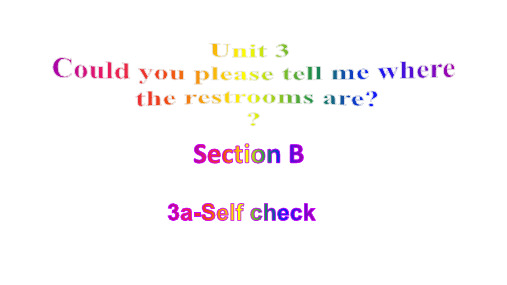
Fill in the blanks with the words in the box.
corner direct polite rush suggest plan
1. A: Could you tell me where the library is? B: It’s on the __c_o_rn_e_r_ of Main and Center Streets.
First, I love reading. Could you please tell me where I can borrow books? Next, I’d like to know how I can ask strangers for help politely if I am in trouble. Last, I may meet many people when I get to America, so I wonder if you could tell me how to greet them.
Thanks for listening!
Q: Could you please tell me where I can get some stamps? A: there’s a post office on Green Street.
Self Check 2
3. shopping center opens / 10:00 a.m. Q: Could you please tell me when the shopping center opens? A: It opens at 10:00 a.m. 4. get to the Japanese restaurant / go along Main Street and turn right on Lake Street Q: Could you please tell me how to get to the Japanese restaurant? A: Sure! Go along Main Street and turn right on Lake Street.
鲁教版英语(五四制)九年级_Unit3_SectionB_重难点知识详解
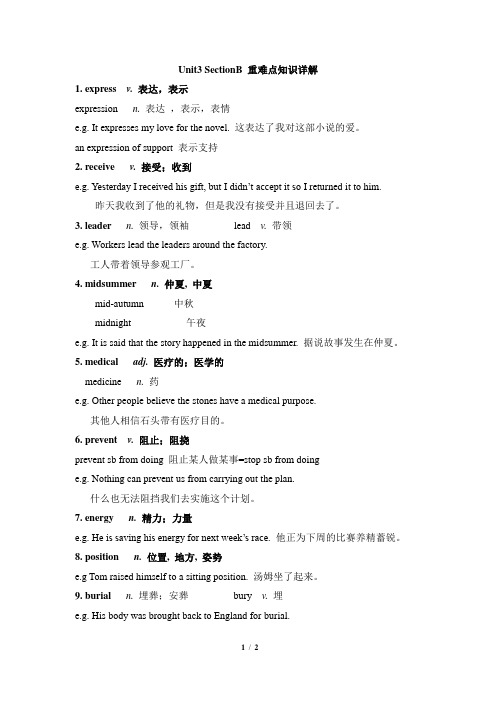
Unit3 SectionB 重难点知识详解1. express v.表达,表示expression n.表达,表示,表情e.g. It expresses my love for the novel. 这表达了我对这部小说的爱。
an expression of support 表示支持2. receive v.接受;收到e.g. Yesterday I received his gift, but I didn’t accept it so I returned it to him.昨天我收到了他的礼物,但是我没有接受并且退回去了。
3. leader n.领导,领袖lead v. 带领e.g. Workers lead the leaders around the factory.工人带着领导参观工厂。
4. midsummer n.仲夏, 中夏mid-autumn 中秋midnight 午夜e.g. It is said that the story happened in the midsummer. 据说故事发生在仲夏。
5. medical adj.医疗的;医学的medicine n.药e.g. Other people believe the stones have a medical purpose.其他人相信石头带有医疗目的。
6. prevent v.阻止;阻挠prevent sb from doing 阻止某人做某事=stop sb from doinge.g. Nothing can prevent us from carrying out the plan.什么也无法阻挡我们去实施这个计划。
7. energy n.精力;力量e.g. He is saving his energy for next week’s race.他正为下周的比赛养精蓄锐。
8. position n.位置, 地方, 姿势e.g Tom raised himself to a sitting position. 汤姆坐了起来。
人教版英语九年级全册Unit3sectionB教学设计

(二)讲授新知
1.教学内容:讲解一般现在时态和一般过去时态的用法,以及问路和指路的句型。
2.教学实施:通过示例、讲解和练习,让学生掌握以下句型:
4.词汇短语练习:抄写本节课所学的词汇和短语,每个词汇和短语各写5遍,巩固记忆。
5.课后反思:反思本节课的学习过程,总结自己在问路和指路场景中词汇、短语、句型和时态的掌握情况,以及课堂参与、合作交流等方面的表现,撰写一篇不少于100词的反思报告。
6.预习作业:预习下一节课的内容,提前了解话题背景,为新课的学习做好准备。
难点:针对不同学生的学习程度,如何进行分层教学,使每个学生都示商场、公园等实际场景,激发学生的学习兴趣,引导学生运用所学知识进行问路和指路。
2.任务型教学法:设计各种听说读写任务,如小组讨论、角色扮演、听力训练等,让学生在实际操作中掌握知识。
(五)总结归纳
1.教学内容:对本节课所学知识进行总结,巩固重点,突破难点。
2.教学实施:教师引导学生回顾本节课所学词汇、短语、句型和时态,让学生复述并举例。同时,针对学生在课堂练习中的表现,进行点评和指导,提高学生的实际应用能力。
五、作业布置
为了巩固本节课所学知识,提高学生的英语应用能力,特布置以下作业:
4.通过课堂互动,激发学生的学习兴趣,引导学生积极参与课堂活动,培养良好的学习习惯。
(三)情感态度与价值观
1.学会尊重他人,关爱他人,培养乐于助人的品质。
2.学会合作与分享,培养团队精神,增强集体荣誉感。
3.增强对英语学习的兴趣,树立自信心,养成良好的学习习惯。
人教版九年级英语全册Unit3.SectionB1a2b优秀教学案例

4.引导学生运用过去进行时描述自己的经历或观察到的事物,培养学生的创新能力和实践能力。
(三)小组合作
1.将学生分成小组,鼓励学生进行合作学习和互动交流,培养学生的团队合作能力和沟通能力。
2.设计小组讨论、角色扮演、共同完成任务等合作活动,让学生在互动中共同解决问题,提高学生的学习效果和综合能力。
4.反思与评价及时有效:教师引导学生对自己的学习过程进行反思,总结自己在学习过去进行时的优点和不足,提高学生的自我认知和自我调整能力。同时,通过学生之间的互相评价和小组评价,培养学生的评价能力和批判性思维。
5.教学内容与过程详细具体:本案例中的教学内容与过程详细具体,包括导入新课、讲授新知、学生小组讨论、总结归纳和作业小结等环节,每个环节都注重学生的参与和实践,使学生在整个学习过程中能够系统地掌握过去进行时的知识和技能。
3.教师根据学生的学习表现和进步,及时给予反馈和鼓励,激发学生的学习动力和自信心。
4.设计适当的形成性评价和终结性评价,关注学生在整个学习过程中的表现和进步,为学生的学习提供指导和帮助。
四、教学内容与过程
(一)导入新课
1.利用多媒体展示一张正在进行的体育比赛的图片,如篮球比赛,引导学生观察并思考:“What are they doing?”,引发学生对过去进行时的兴趣和思考。
2.邀请学生分享他们昨天正在进行的动作或活动,如“Yesterday, I was watching TV.”,通过真实的情景和实例,激发学生对过去进行时的学习欲望。
3.教师通过简单的过去进行时句子,如“When I came home yesterday, my sister was reading a book.”,引导学生理解和运用过去进行时,为新课的学习打下基础。
人教版英语九年级全册Unit3SectionB2a2d教学设计

3.口语作业:布置学生与家长或朋友进行一次关于“Dreams and Aspirations”的英语对话,记录下对话内容,并尝试使用课堂上学到的一般过去时和现在完成时来描述对方的过去经历和现在的成就。
3.组织学生进行小组讨论和合作学习,培养学生的团队协作能力和解决问题的能力。
4.引导学生通过自主学习、探究学习,培养学生的学习策略,提高学习效率。
5.设计丰富多样的课堂活动,如角色扮演、情景对话、小组竞赛等,激发学生的学习兴趣,提高课堂参与度。
(三)情感态度与价值观
在本章节的教学中,教师将关注以下情感态度与价值观的培养:
4.词汇练习:设计一份包含本节课重点词汇的填空、改错或配对练习,要求学生在规定时间内完成,以加强词汇的记忆和理解。
5.家庭作业:鼓励学生在家中寻找一个物品或一张照片,以此为契机,用英语讲述这个物品或照片背后的故事,尝试运用本节课所学的时态和词汇。
6.视听作业:推荐学生观看一部英文电影或纪录片,关注影片中人物的梦想和奋斗历程,并记录下至少5个印象深刻的句子,分析这些句子中使用的一般过去时和现在完成时。
-阅读理解:引导学生通过预读、细读、讨论等方式,深入理解文章内容,提高阅读技巧。
-语言实践:设置真实的语境,如模拟面试、写作练习等,让学生将所学知识应用于实际情景中。
3.教学评价设想:
-采用形成性评价,关注学生的学习过程,鼓励学生自我评价和同伴评价,提高学生的自主学习能力。
-设计总结性评价,如单元测试、写作任务等,以评估学生对本章节知识点的掌握程度。
在此基础上,本章节的学情分析如下:
Unit3SectionB(3a-SelfCheck)课件人教版英语九年级全册
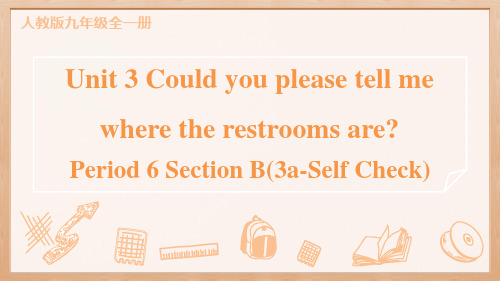
【解析】考查句型“It is +adj.+for sb. to do sth. 对某人来说做……是……”,结合语境可知选D。
返回
基础题·夯实基础
13. Although the match is moving in an unexpected ___D____ , our team will win finally, I believe.
返回
综合题·提升能力
“Excuse me!” the man asked 3. __p_o_l_it_e_ly__ . “Could you please show me the way to the city? And how long does it take to get there on foot?”
返回
综合题·提升能力
【解析】句意为“‘什么?’那个人回头问道”。根据
“ 9. “...Aesop
___W__h_a_t__ shouted to
t?h”ethmeamn,an‘Tlwoookhedoubrasc.’k”以an及d oeuantwitowhiollutraskteoywoaulktwtoo thhoeucrsityto.”w可a知lk 伊to索the跟c了ity他.”
12
special service. 第二段:Many put their thumbs up!
第三段:But some disagree! 第四段:Also
13
14 Silent Taxi Drivers
15
I disagree! I think small talk with taxi drivers relaxing during the trip. (答案不唯一)
专题15.九年级上册:Unit 3 SectionB 知识梳理与精练答案全解全析

九年级上册Unit 3 Section B答案全解全析随堂练习【答案】一、1.ask for help politely 2.sound less polite3.ask a question correctly4.similar requests for directions4. a very direct question 6.in different situations7.depend on8.sound much more polite9.an underground parking lot10.spend time leading into a question or a request二、1.Whom 2.impolite 3.speaker 4.courses5.direction三、1.lend 2.wonder 3.trouble 4.catch5.fresh四、1.correct 2.request 3.address 4.underground5.directions五、1.beautiful 2.one 3.However 4.lonely5.to walk6.happiness7.to8.correct/to correct9.as 10.feeling课堂练习【答案】一、1.normally 2.central 3.politely 4.mailed 5.Italian二、1.everything 2.hanging 3.pleasant 4.staff 5.convenient 6.provide7.safe8.crowded9.fresh10.takes三、1.driving 2.but 3.for 4.reminded 6.why 6.visitors7.impolite8.to be9.a10.saying四、One possible version:Dear Mr. Ma,I'm Miao Hui, a Grade Nine student at Yangguang Middle School. I love English and I hope to improve my English. So I'd like to come to your school soon for the English Summer Camp. I'm writing to know more information about the summer camp. Could you please tell me when the summer camp will begin and how long it will last? I also want to know what we will do during the summer camp. Will it be fun? And could you please tell me where we will stay? I'm wondering if the hotel is clean and comfortable. I also want to know if it is convenient to go shopping. What's more, let me know how much it costs and what I need to take, please. I'd like to thank you for helping me and I'm looking forward to your reply.Yours,Miao Hui。
- 1、下载文档前请自行甄别文档内容的完整性,平台不提供额外的编辑、内容补充、找答案等附加服务。
- 2、"仅部分预览"的文档,不可在线预览部分如存在完整性等问题,可反馈申请退款(可完整预览的文档不适用该条件!)。
- 3、如文档侵犯您的权益,请联系客服反馈,我们会尽快为您处理(人工客服工作时间:9:00-18:30)。
Hi! Where is the East Town?
I don’t know.
Excuse me. Could you please tell me where the East Town is?
Sure. Take No. 23 Bus and you will get there.
Fast-Reading(2a):
3. a teacher Excuse me, Sir? Could you please help me with my homework?
Scene Two:
Zhang Ming is traveling in the USA. He wants to go to a small town but he doesn’t know the way now. What should he do?
We need to learn how to be polite when we ask for help.
Байду номын сангаас
◆Read Para2,answer the question:
What do we need to think about when you talk to different people?
We need to think about whom we speak to or how well we know them.
◆Read Para3,answer the question:
What can lead in to a request with a stranger on the street?
Section B (2a —3b)
翻译词组:
进门测:
1.礼貌地寻求帮助( ask for help politely )
2.例如( for example / such as )
3.类似的寻求方位的请求( similar requests for directions)
4.在不同的情景之中( in different situations )
the school trip is?
3. Peter, tell me 3. Peter, could you
your e-mail
1. Where are the restrooms?
Could you please tell me where the restrooms are?
Direct questions
Polite requests
2. When is the 2. Excuse me, Mr. West.
school trip? Do you know when
Because this will help you communicate better with other people.
Task 1 (2c)
Find all the direct questions and polite requests from the passage.
Direct questions Polite requests
Where do we need to make polite requests? Think of some possible situations. Discuss them with your partner.
Discuss the language you used to
make this request. Was it the same each
“Excuse me, I wonder if you can help me” or “I’m sorry to trouble you, but …” before asking for help.
◆Read Para4,answer the question:
Why is it important to learn how to use the right language in different situations?
Read the article and underline the topic
sentence for each paragraph.
Para1
When you visit a foreign country, it is important
to know how to ask for help politely.
5.取决于( depend on
)
6.与某人讲话( speak to sb
)
7.礼貌得多( much more polite )
8.导入( lead in
)
9.某人花时间做某事(sb. spend time doing sth. )
10.与某人交流( communicate with sb.
)
Before reading
head 总
Para2 Good speakers change the way they speak in different situations.
Para3 Usually polite questions are longer.
body
分
Para4 It is important to learn how to use the right
time?
If not, discuss why not.
Scene One:
n. & v. 要求;
请求
1. your mother or father Mom, can you help me with my homework?
2. your best friend Can you help me with my homework?
language in different situations.
end 总
Careful-Reading
◆Read Para1,answer the question:
What else do we need to learn besides asking a question correctly when you ask for help?
